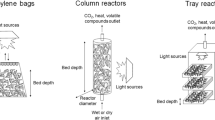Abstract.
Biological control agents (BCAs) are potential alternatives for the chemical fungicides presently used in agriculture to fight plant diseases. Coniothyrium minitans is an example of a promising fungal BCA. It is a naturally occurring parasite of the fungus Sclerotinia sclerotiorum, a wide-spread pathogen which substantially reduces the yield of many crops. This review describes, exemplified by C. minitans, the studies that need to be carried out before a fungal BCA is successfully introduced into the market. The main aspects considered are the biology of C. minitans, the development of a product by mass production of spores using solid-state fermentation technology, its biocontrol activity and marketing of the final product.
Similar content being viewed by others
Author information
Authors and Affiliations
Additional information
Received revision: 22 March 2001
Electronic Publication
Rights and permissions
About this article
Cite this article
de Vrije, .T., Antoine, .N., Buitelaar, .R. et al. The fungal biocontrol agent Coniothyrium minitans: production by solid-state fermentation, application and marketing. Appl Microbiol Biotechnol 56, 58–68 (2001). https://doi.org/10.1007/s002530100678
Received:
Accepted:
Issue Date:
DOI: https://doi.org/10.1007/s002530100678




